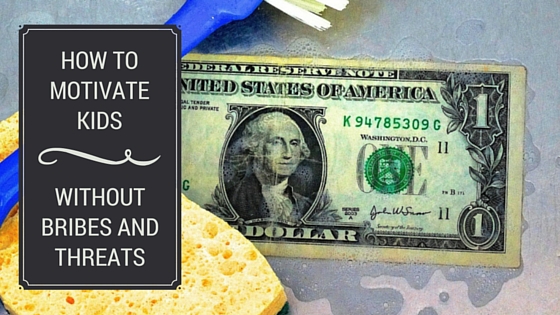When Jason and I teach workshops we get strange looks from people when we start talking about parenting without bribes and punishments.
Understandably, parents get concerned,
“How will I get my children to do things they don’t want to do?”
“How will my kids learn to value things like hard work unless I give them something (money or a reward) to show them that it pays off?”
It’s not so hard to motivate kids to do something they already see the value of.
TRUE STORY: Our oldest daughter LOVES horses. Really, really loves them. She works really hard to make sure she can ride.
When she was 10 years old she started working at a barn during the summer all day long. She worked 6 days a week mucking stalls, cleaning, doing heavy manual labor, and helping the other students. She did all that so she could to learn more about horses, be with horses, and ride horses.
She values her time with horses. We don’t have to motivate her to work hard, we just have to get out of her way.
As they say, “hard work is it’s own reward.”
But what if Alana has to do something she doesn’t naturally value or enjoy, like her math homework.
How do we rely on her “natural motivation” to work hard at math?
It’s a great question.
Strategy #1: Relate it to something that the child already cares about
Alana loves horses, but doesn’t naturally love math. Math is in everything though so showing her how math connects to her interest in horses is not hard. She hopes to own an equestrian center some day. She’ll need math to figure out how much paint to buy to paint the barn, which feed and supplements are the best price, how much wood she’ll need for the new fence, how much money she’s making, and whether her income will cover her expenses.
Ultimately she sees that knowing math will make it easier for her horse-y dreams to come true. It’s in her best interest to work hard at math.
Whatever your child is naturally passionate about you can connect to science, art, history, music, math, literature, writing, or physical education in some way.
But what if you want your child to do something they DO NOT see the value of?
Strategy #2: Talk about your values
There are certain things in life that don’t relate to Alana’s natural interests. There is nothing horse-y about brushing her teeth, or doing the dishes.
So we talk about our family values to help her see the importance of doing these things. Brushing teeth is about valuing and caring for our bodies. We do the dishes because we are a “helping family” and everyone does their part.
But what if your child still doesn’t see the “value of your values”?
Strategy #3: Talk about options and choices
Brushing teeth everyday is not just about family values, it’s also about health. In our house, it’s pretty much a non-negotiable. But you can still offer your children options…
Do you want to brush your teeth or do you want me to do it with you?
Which toothbrush/toothpaste do you want?
Do you want the bathroom light on or off?
What music do you want to listen to while we brush teeth?
(you don’t even have to offer all of these, just 1-2 usually works)
If our kids don’t want to do the dishes and we value everyone contributing to the family what are other ways can they can help out?
They can sweep the floor
Water the plants
Take out the trash
We still have conversations around what is fair to everyone and what feels good to everyone.
We talk with our children about who is going to do chores just like you might hear a team of professionals in a business meeting talk, “How about you do this, I’ll do that? I’d prefer not to do this other thing. Does that work for you?”
Kids love this kind of creative problem solving. They love being treated like a grown-up and they often rise to the occasion.
We’ve covered a few examples here, but what things do you struggle to “motivate” your child to do? Leave them in the comments section below and we’ll give you some ideas of things you can try.
See you in the comments!










How about for young kids, for example by 5 year old never wants to eat her breakfast. Also she is always hitting her younger brother when she is frustrated and nothing we say tends to make her stop
It’s hard to know exactly how to help without having a conversation with you. However starting with empathy, helping her to understand her feelings is a good place to start. Kids behave well when they feel well. Her behavior is communication.
Not sure if this will get a response (as post is years old) but here goes. I started rewarding my son with tablet time (out of desperation) for writing about 6-8 months ago. I am now seeing that is only going to lead to less writing and more desire for tablet time. I’m afraid that linking his writing to his love of Pokemon or Minecraft will not be enough incentive – screen time has been a huge motivator. I can’t think of another way to motivate him to write (it’s laborious for him to write and he say he doesn’t like writing). He doesn’t have a problem coming up with things to write when the carrot of screen time is dangled in front of him, if I take that away, he complains any idea I offer is not interesting and that he doesn’t know what to write (shopping list, journal entry, Pokemon story, filling a jar of wishes, etc.) I guess part of my question is how to stop bribing or offering a reward? How to replace it so he still wants to write? Especially when the desired behavior is still being met and the long term consequences of bribery/reward are still a ways off.
Elizabeth, your question is basically–how to intrinsically motivate a child to do something that he doesn’t think is useful or valuable? You might not like my answer…. Your options are to search more and hopefully to find something about writing that he finds useful and valuable to motivate him, OR to wait, trust that he knows what is best for himself and his life, and when he finds that thing that he really needs writing for, that he will catch up.
I am interested how it works with little kids. I have 5 ant 2 year old boys. They fights and screams a lot, it is dificult put them to sleep and they don’t want put their toys in order. how to motivate them?
Ask the kids how/when they’d like to put their toys away. Maybe it’s too tough to do at bedtime when they are tired. :)
How do you suggest getting your child to do things in a timely manner?
Our kids trade off days taking care of our dog.(helping family) I had reminded my son this morning that he needed to walk the dog. He kept playing his game on his phone and it was hard to pull him away. Our dog needs to go on a walk by a certain time so she can go potty. I had to continue to ask him, which makes me sound like a nag. Then, I tend to lead into consequences and convincing.
Thanks!
Ask him, “What should I do when you’re on the phone and it’s time for you to do something?”Have him come up with a solution! :)
I’ve been trying this style for ages. We get a flat ‘No, I’m not doing it and you can’t make me’ from 2 of the 4 kids (12yrs and 6yrs). I say, this is what needs to be done today, and say 2 or three things and ask which one they’d like to do and they say they are not interested in doing any of them. When asked what they WOULD feel ok doing they lose it and retreat to their rooms or outside, slamming doors and yelling. To be fair, there are mood disorders involved in both kids.
That sounds tough, Amanda. Do they respond better when you have conversations with them individually?
No, that is the individual conversations. It’s frustrating too because the 2 younger kids are a lot more easy going but are picking up this style too (especially the 4 yr old). We are going to have some family therapy later this year so hopefully something might come of it.
Amanda, sorry I don’t have better guidance–hard to offer you anything useful unless we had a longer conversation. If you were interested in going deeper I do work with families individually.
Thank you, I’ll keep it in mind :)
You’re welcome! Hugs!
Wow, I’m reading this and realizing I’m just edging into the intermediate phase of being able to actually put these techniques into practice. That’s why it’s good to keep revisiting the ideas. If I didn’t keep doing the drive-bys, I wouldn’t be able to gauge my progress. Plus, it helps to flex the strategies for the different stages of development kids and grownups go through.
I love that you keep on doing your “drive bys”. You are one of the examples that we tell people about if they think this stuff won’t work for them because it’s “too late” or their kids are too old. Thanks for being a grandma who is still growing and learning with her grandchild.